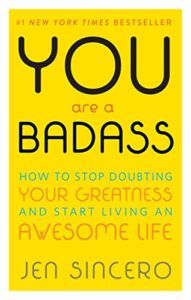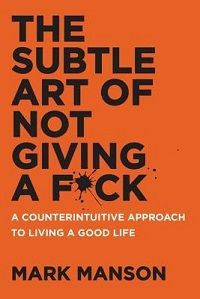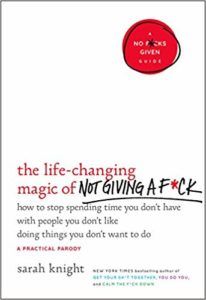Brightly colored covers blare against sans serif fonts. Strategically placed asterisks keep it all above board. Many of these books skyrocketed to bestsellers lists, and parked for years. It all started with Samuel L. Jackson. If you were on the Internet c. 2011, you likely heard him read the satirical bedtime story by Adam Mansbach, Go the F*ck to Sleep. While gleefully imagining Jules Winnfield wrestling with an obstinate toddler, we had no idea just how commonplace it would all soon become. The titles range from the borderline cringeworthy (Manifest That Shit) to the aggressively mundane (Yes, Bitch! I Paid $250 for a Notebook of 120 Blank Unlined Pages and a Shitty Cover). Within this cacophony of vulgarity, there emerged a distinct sub-genre of swearing self-help books. Who writes all these self-help books with swear words? Where did they come from? Are they here to stay?
Jen Sincero’s Tough Girl Talk
Way back in 2013, when we were still young, Jen Sincero published the now ubiquitous You Are a Badass. An extended girl power anthem, Sincero infused You Are a Badass with her rocker chick persona. Though the advice itself is largely unoriginal (dump your negative friends!), Sincero has a strong voice as a writer. Sincero knows her golden ticket is her punk rock lite style, and she leans into it. Likewise, You Are a Badass leans into its scrappy reputation. Though she was already a bestselling author, it took a full two years after its publication for the book to hit the NYT list. Running Press, an imprint, of an imprint of Hachette that’s better known for its novelty books, first published it. However it got there, You Are a Badass endures. After almost 190 weeks on the bestseller list, it eclipsed the record of every other book on this list (so far). You’ve likely seen the highlighter yellow cover of her book on the subway, on your Audible home page, and on your friend’s Instagram feeds. It doesn’t look like it’s going anywhere anytime soon.
The Subtle Art of Thinly Veiled Stoicism
The only book poised to break Sincero’s record is The Subtle Art of Not Giving a F*ck by Mark Manson. As of this writing, it has spent 172 weeks on the NYT Bestseller List. While Sincero preaches the gospel of unabashed hedonism, Manson’s advice falls into, “life sucks, but you can work to make that suck mean something.” In other words: stoicism. Stoicism is the classical Greek philosophy based on the logic that life will be hard whether we like it or not. The most virtuous thing to do is to endure hardship without complaint, while strengthening our values. Arguably, Manson’s plainspoken style comprises most of his appeal. It’s frankly much more interesting to absorb 3rd century BCE philosophy when it comes from the guy who sounds a like your dad. Manson is also the only author on this list who openly acknowledges that things happen that are out of your control. Though multiple authors on this list consider themselves subversive, by confirming the random nature of existence, Manson actually subverts common self-help truisms.
UnWhat my What?
Self-described “urban philosopher” Gary John Bishop first ascended to popularity with his book, UnFck Yourself. Though he didn’t spend as long on the bestseller list as others on this list, you’ve no doubt seen his book alongside the others in this piece. Bishop’s origins are complicated. Cagey about the specifics of his early life, he grew up in a rough part of Glasgow and emigrated to the US in 2007. After scraping by as a construction worker, he began working for the controversial personal development company Landmark. He originally self-published UnFck Yourself. It sold over 40,000 copies in just a few weeks. Publishing giant Harper Collins eventually picked it up. The thesis of UnF*ck Yourself is thus: “you are 100 percent responsible for what you do with your life.” Bishop claims the target audience of his book is single mothers and blue collar workers. However, it’s hard to see exactly how Bishop is empathetic to the underprivileged. He acknowledges systemic oppression to some extent, while also writing off many of its real challenges. None of these paradoxes have stopped Bishop’s star from rising, as he currently has three books in the works.
It’s Sarah Knight’s F*cking World, We Just Live In It
After 15 years at various high-flying publishing jobs, in 2015 Sarah Knight decided to say “fuck it.” And how did she do this? By publishing a book with “fuck” in the title. With that, an empire was born. A play on The Life-Changing Magic of Tidying Up, Knight’s first book is, The Life-Changing Magic of Not Giving a Fck. The book has very little to do with Marie Kondo’s bestseller, other than as a marketing tool (Disclaimer: I am a big Kondo fan). Knight isn’t even the first author to combine Marie Kondo and profanity. Though, regularly churning out guides gave her staying power that her peers at the time couldn’t quite accomplish. Despite frequent confusion with Mark Manson’s Subtle Art, the No Fcks Given Guides are closer in ideology to Jen Sincero’s badass series. Take risks! Live the life you want! Knight operates out of a sort of nihilistic positivity: don’t give a fuck! Then you’ll have space to do what you want to do. Knight’s entire brand is about carefully subverted norms. Publicity photos feature her wearing a ball gown in a pool. She describes herself as the, “anti-guru.” Yet behind the whimsy lies a shrewd business person; her years as an acquisitions editor gave her firsthand knowledge of what publishing trends were on the rise. Despite her renegade branding, her advice is decidedly mainstream. So far, Knight has five books, two companion journals, a companion daily calendar, and no sign of stopping. She has cornered the market on self-help books with swear words.
So, Will These Swears Help Me?
On the surface, the appeal is unclear. Cursing is uncouth, unprofessional, and taboo. Agony aunts will still point out when you say “crap” on Facebook. Why would anyone want advice from such a vulgar place? But as Dan Brooks pointed out in The New York Times, we are “a society in which real, enforced taboos still exist but are outnumbered by the expanding category of utterly safe rebellions for which we congratulate ourselves daily.” Those same agony aunts likely enjoy the Netflix show The Ranch. Despite its classic sitcom format, it’s peppered with as many fucks as a Quentin Tarantino movie. Though many still hold onto the ideals of propriety, the truth is that “profanity is utterly basic.” And in that paradox lies the appeal. We want what we can’t have. We like what we’re told is bad. Words like “fuck” and “bullshit” imply a straight-shooter. However, as a marketing strategy they come off more like the person who orders dessert at a restaurant followed up with “I’m so bad.”
Blind Spots
What’s missing from all of the punchy, in-your face advice? The fact that these people come from a place of immense privilege. All of these authors are white. Most are college educated. Jen Sincero is “unapologetically rich.” When Sincero says, “if my broke ass can get rich, you can too” she conveniently leaves out the fact that her “broke ass” grew up in a wealthy suburb of New York and attended a private college. Sarah Knight spent 15 years in publishing (a notoriously competitive industry) after graduating from Harvard, before bravely moving to the beautiful tropical paradise of the Dominican Republic. Even considering his hardscrabble upbringing, as a white man Gary John Bishop has a lot of social privilege. Our perception of Scots as champion swearers doesn’t hurt either. It’s hard to imagine a Black woman breezing past the “angry black woman” trope in order to pen a plainspoken, profane bestseller the way Bishop did. At best, refusing to acknowledge personal advantages could cause anxiety in less fortunate readers. At worst, it preys on the vulnerable, promising, “just pay for this seminar, this book, this meditation CD, and all of your problems will be solved.” In a meta move, even Mark Manson wrote a blog post about the snake oil of the self-help industry. Using swear words is a great way to convince your audience that you’re “just like them!” In reality, these people often have little in common with the millions of people who lap up their books. They’re hungry for a solution to their problems, but leave feeling worse about themselves. I will admit, I fell for the hype. When you feel like a loser, it feels good to be told that “you are a badass.” When you care too much what other people think, you want to know “the subtle art of not giving a f*ck.” But in terms of what they actually have to offer, most of these books are full of old-fashioned advice in shiny, gimmicky packaging.



